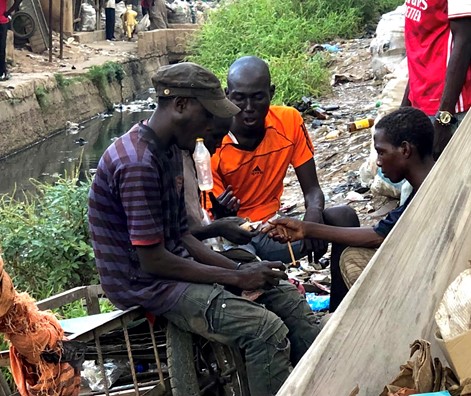It was a month to Saleh Inusa’s* 14th birthday. Looking dishevelled, the primary school dropout was sniffing a bottle of glue known locally as “sholisho”. He was seated close to a large open drain that serves as an unofficial public toilet for Almajirai (young nomadic seekers of Islamic knowledge) and homeless people in the ancient, porous Kurmi market of Kano State.
Next to him was 25-year-old Abdullahi Danladi, who had a map of scars on his face. He was trying to find a vein to inject opioid to his bloodstream. His swollen arms were full of collapsed and damaged veins. Danladi had the typical look of a drug addict.
Another rugged-looking boy of about seven, who had on dirty and tattered clothes, was at a nearby corner trying to pour gum into an empty water sachet he had picked from nearby trash. HumAngle was later told the boy was an Almajiri who ran away from his school and joined the gang of “yan sholi” (glue sniffers; singular: “dan sholi”) at the Kurmi market.
He was not the only Almajiri among them. Abubakar Oduduwa, now in his thirties, is another Almajiri who joined the gang at a tender age. Sniffing the sholisho gum and consuming other hard drugs had damaged his brain and made him deranged.

Sholisho is a toxic glue used for vulcanising punctured tyres of bicycles and motorcycles. A bold warning on its container says it is dangerous and hazardous to health. Swallowing the glue could lead to death, the manufacturers clearly indicated.
However, yan sholi are barely literate enough to understand the warning. Most of them are of primary school age and some are secondary school dropouts from less privileged families that could not secure their education. A handful of them are Almajirai who ran away from school.
Saleh was introduced to sniffing sholisho when he was less than 10. His brother took him to Kurmi Market where he met other addicts and copied from them — not only sniffing the toxic gum but their distinctive qualities, from their style of dressing to the ways of talking.
Gateway to Drug Abuse
In 2019, Kano was pronounced as the state with the third-highest number of drug abusers in Nigeria. The previous year, the Director-General of NAFDAC said about 70 per cent of youths in the state abused illicit drugs, but the number dropped in 2019.
Children, mostly boys, who left their homes at young ages are among the large percentage of drug abusers.
Drug abuse imperils the future of youth in the state, having disastrous effects on the abusers’ education and economic participation.
However, the state government and other law enforcement agencies concentrate on adult abusers of other hard drugs and give little attention to the yan sholi who are often young boys.
The shortage of NDLEA (National Drug Law Enforcement Agency) staff and lack of enough rehabilitation facilities make operations against drug dealers and consumers a Herculean task.

Saleh said he usually went for the cheap and available sholisho to get high because he couldn’t afford expensive hard drugs. The wholesale price for the glue is N100 but syrup with codeine could go for as high as N2,000 and the illegal peddlers don’t sell it to young boys.
“Sholisho is the gateway to consuming other narcotics and is cheaper than marijuana,” a former dan sholi who overcame his addiction told HumAngle.
The danger of allowing the little children to continue sniffing the glue is not only in its hazardous effect on health, but it’s also a door young children and adolescents pass through before they go on to take other hard drugs.
Even if arrested, yan sholi get released within a short period without rehabilitation.
Several yan sholi who suffer from brain damage due to sniffing the glue could be seen laying close to the open drainage where they used to gather to get high because of a lack of access to rehabilitation services.
“Children as young as seven years old come here and few of them leave before they become mad,” a bicycle repairer close to them told HumAngle.
‘Why We Sniff Glue’
When asked why they sniffed the glue, most yan sholi resorted to metaphysical justifications and associated their addiction with fate.
Danladi says nobody can escape his fate and sniffing the glue is his destiny against his wish. “Man can not escape his destiny,” he said, quoting Muslim Prophet, Muhammed, to back his argument.
Sholisho gives a placebo effect to the sniffers but leaves them with short and long-term health consequences.
“The feeling is temporarily charismatic and leaves us fresh with no worries,” Saleh said.
He explained that the glue has the same effect in terms of addiction like any other drug but it lasts a few minutes.
Some of the glue sniffers associated their addiction to the influence of peers and the effect of broken homes. “I always go home and my mother wants me to stay; but even if I try quitting I come back after some days,” one of them said.



Comments
Post a Comment